人教版高中英语选修7 Unit5 Using language 优质教案
- 格式:doc
- 大小:1.48 MB
- 文档页数:8
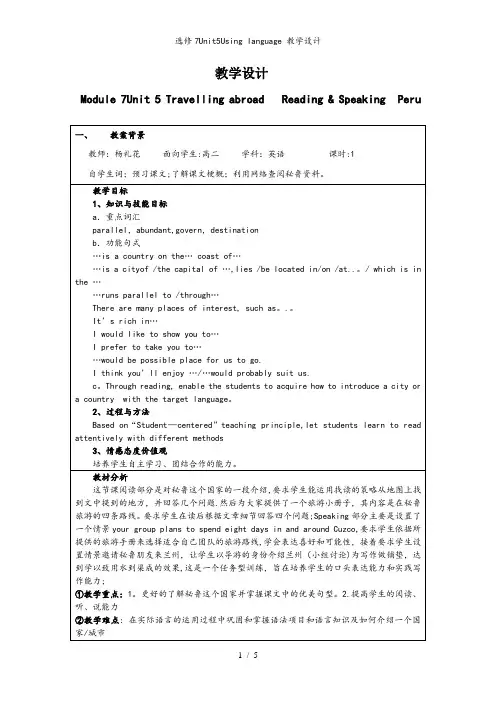
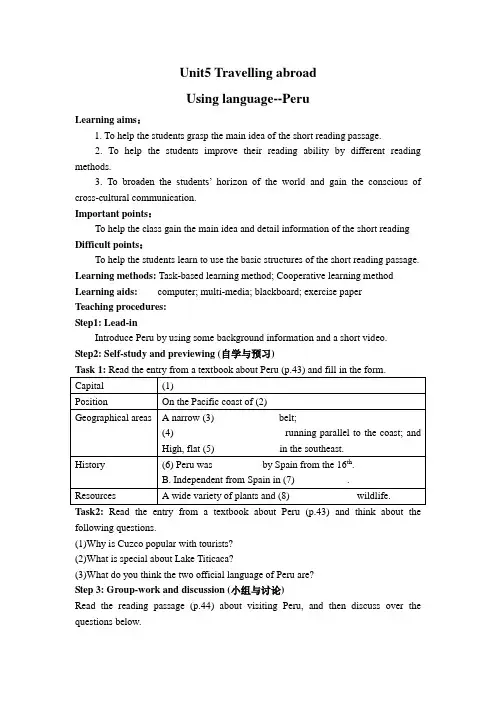
Unit5 Travelling abroadUsing language--PeruLearning aims:1. To help the students grasp the main idea of the short reading passage.2. To help the students improve their reading ability by different reading methods.3. To broaden the students’ horizon of the world and gain the conscious of cross-cultural communication.Important points:To help the class gain the main idea and detail information of the short reading Difficult points:To help the students learn to use the basic structures of the short reading passage. Learning methods: Task-based learning method; Cooperative learning method Learning aids: computer; multi-media; blackboard; exercise paperTeaching procedures:Step1: Lead-inIntroduce Peru by using some background information and a short video.Step2: Self-study and previewing (自学与预习)Task2: Read the entry from a textbook about Peru (p.43) and think about the following questions.(1)Why is Cuzco popular with tourists?(2)What is special about Lake Titicaca?(3)What do you think the two official language of Peru are?Step 3: Group-work and discussion (小组与讨论)Read the reading passage (p.44) about visiting Peru, and then discuss over the questions below.Tour 1:1. What can people see on tour 1?2. In what way will people get there?Tour 2:3. What places will people get to?4. In what way will people get there?Tour3:5. What places will people get to?6. What can people do on this tour?Tour4:7. What places will people get to?8. In what way will people get there?Step4: Exercise in the class(课堂小练)1. On which tours can you visit the famous Inca ruins of the city of Machu Picchu?A. Tour 1 and Tour 2B. Tour 2 and Tour 3C. Tour 1 and Tour 3D. Tour 3 and Tour 42. If you want to get an opportunity to learn about the Uros Indian’s life, you can choose ____ _.A. Tour 1B. Tour 2C. Tour 3D. Tour 43. You can _______________ on Tour4.A. explore the jungleB. enjoy some excellent foodC. buy some great souvenirsD. stay with a local family for a full-day Step 5 SummaryStep 6 HomeworkWrite a travel tour for Xi’an in no more than 100 words.。
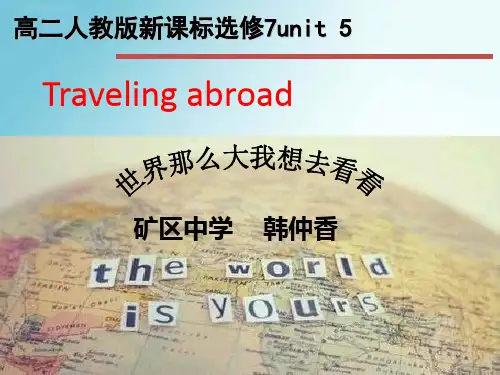
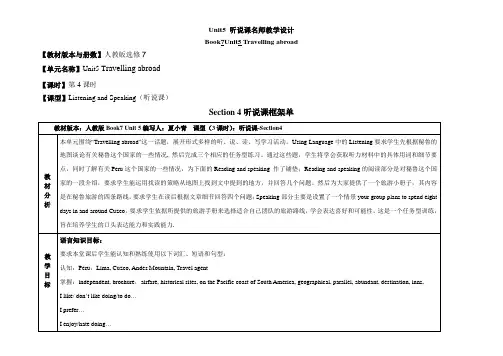
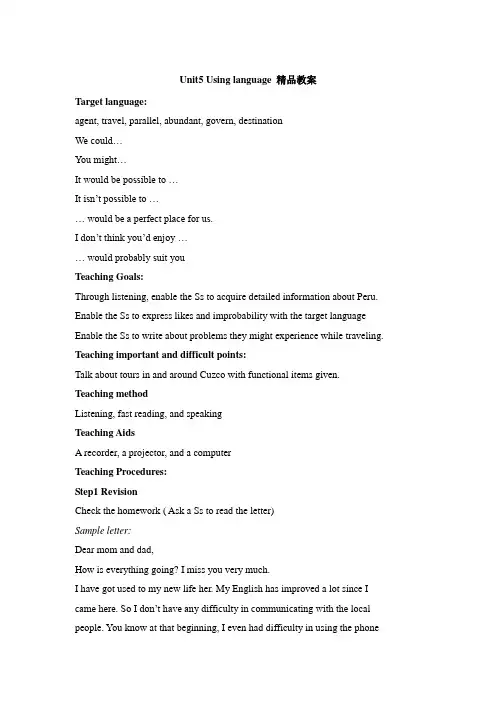
Unit5 Using language 精品教案Target language:agent, travel, parallel, abundant, govern, destinationWe could…You might…It would be possible to …It isn’t possible to …… would be a perfect place for us.I don’t think you’d enjoy …… would probably suit youTeaching Goals:Through listening, enable the Ss to acquire detailed information about Peru. Enable the Ss to express likes and improbability with the target language Enable the Ss to write about problems they might experience while traveling. Teaching important and difficult points:Talk about tours in and around Cuzco with functional items given. Teaching methodListening, fast reading, and speakingTeaching AidsA recorder, a projector, and a computerTeaching Procedures:Step1 RevisionCheck the homework ( Ask a Ss to read the letter)Sample letter:Dear mom and dad,How is everything going? I miss you very much.I have got used to my new life her. My English has improved a lot since I came here. So I don’t have any difficulty in communicating with the local people. You know at that beginning, I even had difficulty in using the phoneand paying on the bus. I was encouraged by my tutor to give my own opinions in the essay. And now I get really good marks. I feel so confidentI enjoy living with my host family. They helped me a lot with my everyday life and understanding of local customs. They are very kind and warm-hearted. So don’t worry about me.Send my love to grandpa and grandma.Your love,Xie LeiStep2. ListeningDeal with listening in Using Language“Today we will travel to Peru. First, let’s look at the map of South America on page 42. Find the cities of Liam and Cuzco and the Andes Mountains.Who can describe their locations according to the map?”Lima, Capital City, lies on the west coastCuzco, in the South Mountainous area, the site of ancient capital of Inca civilizationAndes Mountain, runs parallel to Pacific Ocean, the longest mountain in the worldEtc.Listen and do Exercise 2.Listen again and do Exercise 3&4 on page 42.If necessary, listen to it several times.Step3 Reading“OK, after listening, we have known about Lia’s travel plan. Would you like to take a tour there? Before you go, let’s learn something about this country. Now look at the reading passage in Reading and speaking. Read the text and underline the places mentioned in it.”The Ss are supposed to underline: costal belt, the Andes Mountains, high flat。
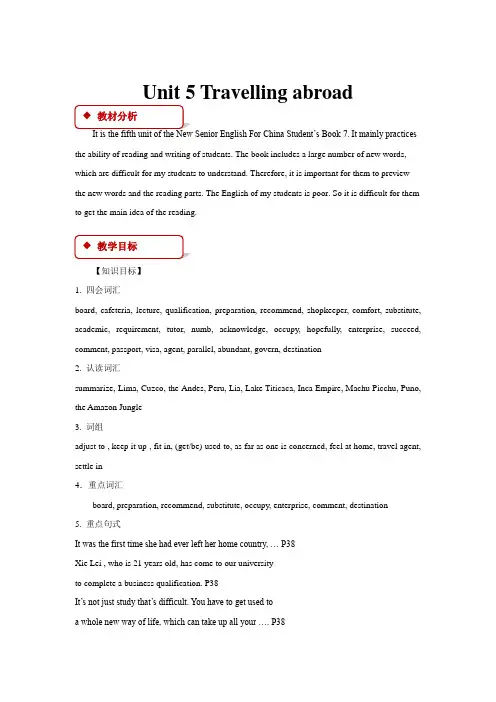
the ability of reading and writing of students. The book includes a large number of new words, which are difficult for my students to understand. Therefore, it is important for them to preview the new words and the reading parts. The English of my students is poor. So it is difficult for them to get the main idea of the reading.【知识目标】1. 四会词汇board, cafeteria, lecture, qualification, preparation, recommend, shopkeeper, comfort, substitute, academic, requirement, tutor, numb, acknowledge, occupy, hopefully, enterprise, succeed, comment, passport, visa, agent, parallel, abundant, govern, destination2. 认读词汇summarize, Lima, Cuzco, the Andes, Peru, Lia, Lake Titicaca, Inca Empire, Machu Picchu, Puno, the Amazon Jungle3. 词组adjust to , keep it up , fit in, (get/be) used to, as far as one is concerned, feel at home, travel agent, settle in4.重点词汇board, preparation, recommend, substitute, occupy, enterprise, comment, destination5. 重点句式It was the first time she had ever left her home country, … P38Xie Lei , who is 21 years old, has come to our universityto complete a business qualification. P38It’s not just study that’s difficult. You have to get used toa whole new way of life, which can take up all your …. P38I have been so occupied getting used to everythingthat I haven’t had time for social activities. …. P39I’m going to join a few university clubs and hopefullyI’ll meet some people I have things in common with. … P39Why does Lia prefer to…?I like/don’t like doing/ to do…I prefe r to…【能力目标】Enable Ss to know something about volunteer and Jo’s work in PNG as a volunteer teacher.Help Ss to learn about PNG and find out more information about the country through internet.【情感目标】Make Ss know what is a volunteer and the spirit of volunteers.Get the Ss to realize that they should make the most of what they own and do something for the poorHelp them realize the importance of sharing.【教学重点】Talk about travel or live in another countryPractise expressing and supporting an opinionRevise the Attributive Clause (non-restrictive)Write a letter to a penfriend.【教学难点】How to revise the Attributive Clause(non-restrictive).How to improve communication skills.How to write a letter.Multimedia。
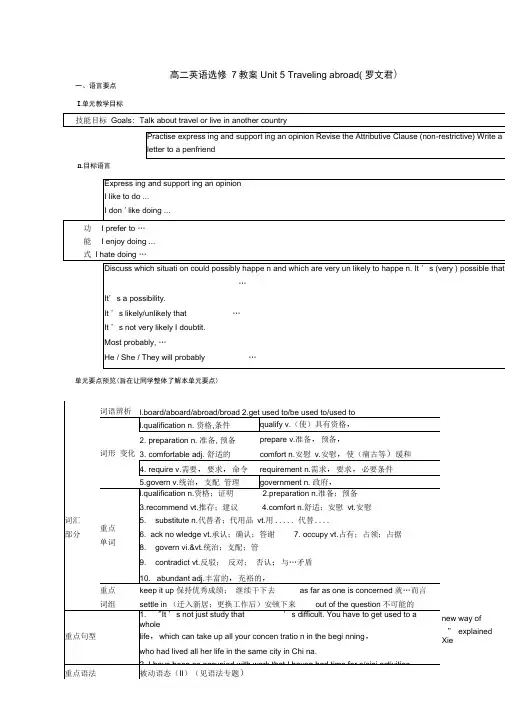
高二英语选修 7教案Unit 5 Traveling abroad( 罗文君)一、语言要点I .单元教学目标n .目标语言单元要点预览(旨在让同学整体了解本单元要点)new way of ” explainedXieIII.教材分析与教材重组 1.教材分析本单元以travelling abroad 为话题,旨在通过单元教学,使学生了解在国外旅行或学习 时可能会遇到的一些问题,并学会怎样去解决问题和避免这样问题的发生。
学会表达和支持个人观点,能用所学的有关travelling abroad 的词汇描述在国外居住生活的情况 ,在国外旅游时能根据所给的信息选择恰当的旅游线路, 能推测什么事情可能会发生, 哪种情况不会发生,会正确使用非限制性定于从句。
WARMING UP 提供了四个有关旅行的问题,让学生用已有的知识和经验讨论在国外居住或旅行会遇到什么问题,并且该如何来解决这些问题。
1. 2 PRE-READING 是READING 的热身活动。
提供了两个问题,它要求采用与同学 讨论交流的方式谈论在国外学习的利与弊,激发同学们的学习兴趣。
1. 3 READING 是一篇介绍中国女孩谢蕾在伦敦学习的情况。
使学生对比在国内学习 与在国外学习的不同。
Try to un dersta nd some of the ben efits and difficulties she has in London.1. 4 COMPREHENDING练习1通过四个问题来检查学生对课文的细节的理解。
练习2以图表的形式来分析在国外学习的利与弊。
练习3设置了五个讨论题, 通过这些话题的谈论, 挖掘文章的深层含义, 激活学生自身的认 知能力和思想认识能力。
练习4是概括能力训练题,在理解的基础上,重点训练学生的概括能力。
1. 5 LEARNING ABOUT LANGUAGE 分词汇和语法两部分。
其中, Discovering usefulwords and expressi ons 是训练学生在语境中掌握词汇的能力,帮助学生加强动词变化形式的 意识o Revising usefulstructures 是关于非限制性定于从句, 旨在训练学生对定语从句的理解、掌握和运用,并通过语法练习加以巩固。
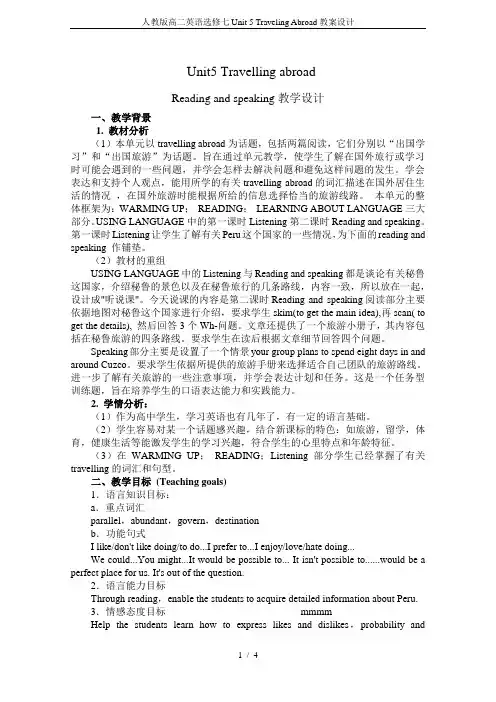
Unit5 Travelling abroadReading and speaking教学设计一、教学背景1. 教材分析(1)本单元以travelling abroad为话题,包括两篇阅读,它们分别以“出国学习”和“出国旅游”为话题。
旨在通过单元教学,使学生了解在国外旅行或学习时可能会遇到的一些问题,并学会怎样去解决问题和避免这样问题的发生。
学会表达和支持个人观点,能用所学的有关travelling abroad的词汇描述在国外居住生活的情况,在国外旅游时能根据所给的信息选择恰当的旅游线路。
本单元的整体框架为:WARMING UP;READING;LEARNING ABOUT LANGUAGE三大部分。
USING LANGUAGE中的第一课时Listening第二课时Reading and speaking。
第一课时Listening让学生了解有关Peru这个国家的一些情况,为下面的reading and speaking 作铺垫。
(2)教材的重组USING LANGUAGE中的Listening与Reading and speaking都是谈论有关秘鲁这国家,介绍秘鲁的景色以及在秘鲁旅行的几条路线,内容一致,所以放在一起,设计成"听说课"。
今天说课的内容是第二课时Reading and speaking阅读部分主要依据地图对秘鲁这个国家进行介绍,要求学生skim(to get the main idea),再scan( to get the details), 然后回答3个Wh-问题。
文章还提供了一个旅游小册子,其内容包括在秘鲁旅游的四条路线。
要求学生在读后根据文章细节回答四个问题。
Speaking部分主要是设置了一个情景your group plans to spend eight days in and around Cuzco。
要求学生依据所提供的旅游手册来选择适合自己团队的旅游路线。
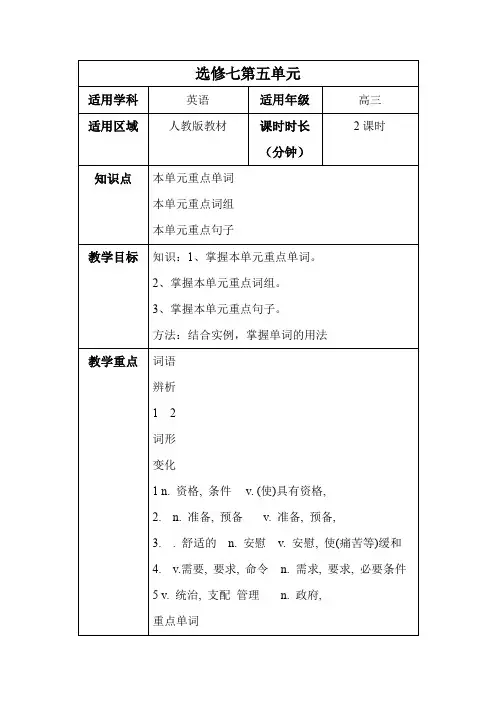
教学过程一、课程导入二、复习预习复习上节课主要内容三、知识讲解知识点1:词语辨析1 n. 资格, 条件v. (使)具有资格,2. n. 准备, 预备v. 准备, 预备,3. . 舒适的n. 安慰v. 安慰, 使(痛苦等)缓和4. v.需要, 要求, 命令n. 需求, 要求, 必要条件5 v. 统治, 支配管理n. 政府,【练习】根据句子结构,用括号内所提供词的适当形式填空1) a . a .()2) . ()3) a . ()4) . ()5) , I’ .():1) ; ; 2) ; 3) ; 4) ; 5) ; ; ;知识点2:词语辨析1).【解释】n.(木, 纸)板;滑水板.用板铺;用板盖; 上(船、车、飞机)船舷; 甲板;. . 在船(飞机、车)上, 上船(飞机、车).往国外, 海外,.宽的, 阔的, 广泛的.宽阔地【练习】选择或并用其适当的形式填空1) , a .2) a .3) .4) ,5) .6) .7) .: 1) 2) 3) 4) 5) 6) 7)2).【解释】. 习惯于……(侧重于动作). 习惯于……(侧重于状态)被用做……(被动语态)过去常常(强调现在不再存在)【练习】选择或,并用其适当的形式填空1) . .2) I’m .3) .4) .: 1) 2) 3) 4)知识点3:重点词汇1. n.资格;证明[重点用法]v. (使)具有资格,证明合格当任(职务等)的资格在(某方面)具有资格取得资格,合格取得……资格有……资格,有……权;应得;使合格,使能担任,使适合于..使某人有资格做某事[典例]1) ’s a ?取得当一名医生的资格是什么?2) ? 申请这个工作你得要具有的条件是什么?3) ? 你有投票资格吗?4) I a . 我希望取得教师资格。
5) A . 你的英语程度教书不够资格。
[练习] 汉译英1) 经过大学四年的学习,他终于取得了当律师的资格。
2) 一纸大学文凭并不意味着能让你有获得这份工作的资格。
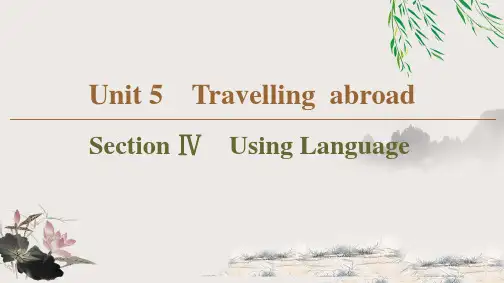
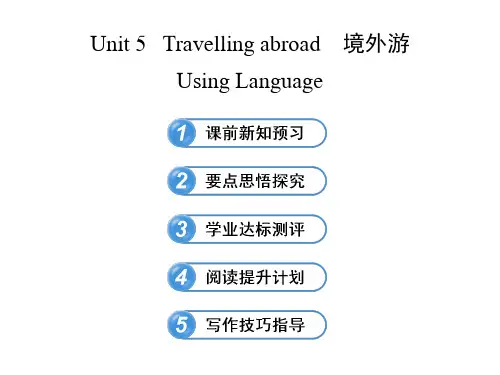
2019学年度人教版选修七Period5Using Language教案设计Teaching goals 教学目标1. Target language目标语言:a. 重点词汇和短语adjust to,advantage,find out ,youth hostels,communityb. 交际用语expressing and supporting an opinionYou might …It’s a possibility...Proba bly…It’s (very) possible that...It could happen.Most probably...It’s not very likely… I doubt it.He/She/They will probably...2. Ability goals能力目标Enable the students to discuss what they would learn when traveling or living in another country. And how to deal with the problems and dangers that could happen while traveling in a foreign country.3. Learning ability goals 学能目标Help the students learn how to deal with the problem that they could meet while traveling..Teaching important points教学重点Let students learn to use the structures of expressing and solve the problems. Teaching difficult points 教学难点How to deal with the problems that are likely to happen when traveling and how to prevent them.Teaching methods教学方法1. Looking at the questions. (individuals).2. Pairs work to discuss and work in groups of four.(task-based , cooperative learning).Teaching aids教具准备1. A computer2. A projectorTeaching procedures & ways教学过程与方法Step I Greeting and RevisionT: Good morning/afternoon, boys and girls! First, let’s check the homework.1.Check whether they have remembered the ten important sentences.2.Check whether they have previewed the new words and expressions in this unit.Step II Warming up*Talk about the problems with the teacher’s help.T: If you had chance to go abroad in the world, which country would you like to visit and why ? and what kind of things would you meet or learn best? Look at the problems on Page 37. You can discuss the following questions with your partner. Qs: 1.If you could go anywhere in the world, which country would you like to visit and why?2. What kind of things would you learn best by being a tourist in a country andwhat would you learn best by working or studying there?3. How differences or easy do you think it is to adjust to living or traveling inanother country? What kind of differences might you experience?4. Have you talked to anyone who has spent some time in another country? Whatdid they find unusual or difficult about it?DiscussionSa: If I had chance to travel abroad, I’d like to visit New Zealand. It’s said that it’s a beautiful country, I’d like to enjoy the beautiful scenery in New Zealand.Sb: If I had chance, I’d like to go to America. Maybe it is better if I could work or study there, then I could learn English well.Sc: I ‘d like to go to Egypt, because I want to know about the ancient culture.T: What kind of things would you learn best by being a tourist in a country and what would you learn best by working or studying there?Sa: When we travel to another country, maybe we could know about the architecture of the country, the beautiful scenery, the economic situation and so on.Sb: When we work or study in the country, maybe we could know more about the manners and customs of the country. We could learn the standard English better, we could communicate with the local people to improve our English.Sc: If we could live with the local people, we could know the proprieties of the country, know more slang, know the difference in time, food, transportation etc. between the two countries.T: Very good. You can think so many things. Have you talked to anyone who has spent some time in another country? What did they find unusual or difficult about it? Ss: Well, I have talked to my friend who had been to a foreign country, he told me something different or interesting in the foreign country. For example, in India, most people don’t eat meat, especial beef, they like to eat vegetables and fruits, so if y ou invite an Indian for dinner, never order steak for them.Step III SpeakingT: Well, we talked about the things that we could learn while we traveling or studying in a foreign country. Then, what kind of problems or dangers would happen while traveling in a foreign country? Now, turn at page to P82, try to list the dangers and problems, then discuss ways you could prevent these things happening in groups. The following sentence patterns are helpful for you:You might… Most probably, …It’s a possibility… It’s likely/unlikely that…Probably, … It’s not very likely… I doubt it. It’s (very) possible… He/She/They will probably.It could happen.(After a few minutes)T: Well, are you ready ? Who’d like to show us your opinion?Sa: While traveling, it’s possible that you could lose you way, because you don’t know the country very well. To prevent this:◆You’d better take a map of the country with you.◆Don’t le ave alone without saying a word.◆Pay attention to the conspicuous signs, for example, some famous buildings,some special road signs so that you can ask the way while you are lost.Sb: It’s likely that we could meet malefactors--- robber, thief or others. Probably, we will be hurt. To prevent this:◆Don’t show your valuable belongings to others.◆You’d better go along with other people.◆Should you face dangers, connect the police.Sc: It’s (very) possible that we could have difficulty in communicating with t he local people. To prevent this:◆Try to grasp the simple and basic communicated language◆Try to know about the manners and customs of the country◆Try to be familiar with formality in everyday lifeStep IV Talking (若时间不足,可改为作业)T: OK! So much for the questions. You did a very good job, I’m sure that you have known how to deal with the problems while traveling or studying in a foreign country. If we wanted travel alone with a little money, could you find a good way to save money?Sa: Maybe we could travel on foot or by second-class rail.Sb: We could stay at the small inn to save money, but maybe the situation there is not good.T: Well, there is a good and not expensive place for travellers--- Youth Hostels, Hostels provide clean safe place to stay a nd have community kitchens. Now, let’s read something about Youth Hostels and discuss the questions in groups.(5 minutes later.)T: OK. Let’s look at the questions. Are youth hostels expensive or cheap to stay in? Ss: They are cheap. They offer quality accommodation at low cost.T: Yes. And how many people share a bedroom in a hostel?Ss: There are 4,5, or 6 people.T: What is the advantage of staying in a place with a kitchen when you are traveling? Ss: If there were a kitchen in the hostel, I could cook by myself, it’s It is good economy to cook on my own.T: What is the advantage of having a Youthpass?Ss: Youthpass offers travelers cheap train fares in most European countries. It can make you maximize your time and minimize your cost.T: How old must you be to get a Youthpass?Ss: For those under age 26 on their first day of travel.T: Why is it a good idea to buy travel insurance?Ss: Because while traveling, we may face unexpected illness or accident, no matter where you go to in the world, the cost of medical treatment can be very high, if you buy travel insurance, it can afford all medical treatment of you while traveling abroad. T: Then would you enjoy staying in a youth hostel? Why?Ss: Though there are many advantages of staying in a youth hostel, I still like to travel in collective tour. Tourists can help each other in case of an emergency.Ss: Well, I like youth hostel very much. Because I like traveling on my own, I like to enjoy the sense of freedom, I can do whatever I like. Also, it’s convenient for traveler to stay in youth hostel.T: Good. There is little time, let’s look at our homework.Step V Homework1.Learn the new words and expressions by heart2.Let students talk about their experiences of travelling。
高中英语人教版选修7Unit5 Travelling abroad《Using Language Ⅰ》优质课教案省级比赛获奖教案公开课教师面试试讲教案【名师授课教案】1教学目标Knowledge objectivesBy the end of this class, students will be able to master the key words and key sentences.Ability objectivesThrough learning this class, Ss can acquire detailed information about Peru.Moral objectivesAfter learning this class, Ss can learn how to express likes and dislikes, probability and improbability with the target language.2学情分析Since the Ss have never gone abroad,they are not quite familiar with many foreign countries. In this period Ss should get to know some basicpoints of the country—Peru.3重点难点Introduce briefly and properly the country—Peru.Talk about tours in and around Cuzco with functional items given.4教学过程4.1第一学时教学活动1【导入】Lead-inAsk the students something about their travelling abroad.(What places would you like to visit?Why?Where can yo u get information about places of interest?)[设计意图] 联系生活实际,导入话题,激发学生对话题的兴趣,为下文作铺垫。
Unit5 Using Language 优质教案
教学目标
1.语言知识目标:
a.重点词汇
parallel,abundant,govern,destination
b.功能句式
We could...
You might...
It would be possible to...
It isn't possible to...
...would be a perfect place for us.
I don't think you'd enjoy...
...would probably suit us.
It's out of the question.
2.语言能力目标
Through reading,enable the students to acquire detailed information about Peru. 3.情感态度目标
Help the students learn how to express likes and dislikes,probability and improbability with the target language.
重点难点
教学重点:
Introduce briefly and properly the country—Peru.
教学难点:
Talk about tours in and around Cuzco with functional items given.
教学准备
A slide projector and a tape recorder.
Let students surf the Internet to get information about Peru.
教学过程
1Lead-in
Ask the students something about their travelling abroad.(What places would you like
to visit?Why?Where can you get information about places of interest?)
[设计说明]联系生活实际,导入话题,激发学生对话题的兴趣,为下文作铺垫。
Reading
1.Ask the students to read the entry from a textbook about Peru. Find the information they want to know about Peru.
Fill in the missing information.
Geographical areas:
a_narrow_coastal_belt;the_Andes_Mountains;high,flat_plains
The capital city Lima:
in_the_north_on_the_coast
The ancient Inca capital Cuzco:
high_in_the_Andes
The famous Inca ruins Machu Picchu:
close_to_Cuzco
Andes Mountains:
run_parallel_to_the_coast
2.Discuss specialities about this country.At the same time,deal with the questions:a.Why is Cuzco popular with tourists?
b.What is special about Lake Titicaca?
c.What do you think the two official languages of Peru are?
Keys:
a.Cuzco is a popular tourist destination as it is close to the famous Inca ruins of the city of Machu Picchu.It's a city where both Indian and Spanish culture and art can be seen.
b.Lake Titicaca is the highest lake in the world,and boats can travel on it. c.They are Indian and Spanish.。